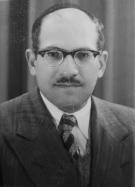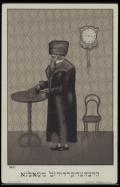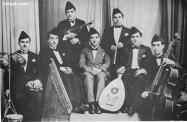(103 results found)
39-40. Golden Manangĕ + My Dear Mamuchi
… gatherings in Kochi—occasions on which other thoroughly secular songs were also performed and enjoyed. The format of … his own melodies for all three or borrowed from popular secular songs of the day. Songs 39 and 40 are filled with …
38. Song About Love
… the soul and God—several women singers view it in more secular terms, making it suitable for inclusion as a song … may also remind the reader of the next two, clearly secular, songs (39 and 40), which are also attributed to …
Rabbi David Buzaglo
… attribute this contrafactum (setting of religious texts to secular melodies) to Rabbi David Buzaglo, who was exposed to …
Yaakov Huri
… and desire to bring people closer to religion, especially secular people. He did not act out of coercion or a desire …
Tish-nigunim Ascribed to Yosl Tolner and the Aesthetics of the Genre
… Yiddish folk songs. [15] Since early modernity, the secular Yiddish songs sung by women and girls became an … example 3 and similar nigunim, on one hand, and traditional secular Yiddish songs, on the other, arises from a … literature (Kauffman 2013)—this musical dialogue with secular female songs attests to the complexity of gender …
Shabbat and Year Cycle Songs from the Collection of James Levy
… of the Levy family, this collection integrates sacred and secular influences from Gibraltar, Morocco, Argentina, and …
James Levy
… is extremely varied and shows connections between secular music and sacred music, as well as Spanish, British, …
A Recovered Voice from the Past
… of Hebrew in Ottoman Palestine, the creation of a new secular Jewish culture, with a new national repertoire of … contexts of his family and social context, sanctified as a secular saint of Jewish sound, whose life was characterized …
Kol Nidrei (Gebet am Jom Kipur) – Kol Nidrei (Yom Kippur Prayer)
… stance for equilibrium and co-existence between the secular and the sacred. [2] Younger than both Engel and …
Fog al-Nakhal (فوق النخل): Multicultural and Transnational Journeys of an Iraqi Folksong
… 1947-1954. Ghazali’s version included the above-mentioned secularized text concerning unrequited love, attributed to …









